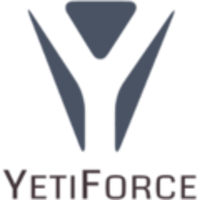YetiForce

An ERP-CRM of indisputable validity
YetiForce (YF) was born in 2014 as a fork of Vtiger CRM 6.x. Uncertain start, even if already with high intrinsic values inherited from Vtiger: one of the most downloaded and used open source CRM on planet earth.
Over time, YF, quietly, is enriched with increasingly appetizing features that make it, over a few years, a high quality product, often compared with commercial products like SalesForce.
From a strongly CRM-oriented product, it grows authoritatively to become a product of the ERP-CRM family: easy, intuitive and still evolving today.
Its flexibility and ability to adapt to a company's information and production methods make it appealing.
The latest version (5.x) has more than 80 modules to fully manage the most common pipelines: marketing, sales, realization, production, post-sales support. But this is what we see with the naked eye: what is not seen, but which is of great importance, is the structural solidity of the software that has been maintained and improved over time. High quality design and development that will allow YF to expand over time without major problems. Quality design and development are extremely important for a product that must last and grow: but testing? Being an open source product excellently closes the circle. YetiForce is downloaded, installed and used in production by thousands of people who, inevitably, discover defects and problems that, submitted to YF developers, are resolved in adequate times and with different priorities. All at zero cost, zero cost testing. There is no commercial product in the world that can make use of such a testing power. Even Microsoft, Samsung and Google have had to recognize the validity of open source, becoming "Platinum member" of the Linux Fondation: emblem of open source in the world. Microsoft contributes, every year, with half a million US dollars ($ 500,000.00) for the development of open source software (do you remember that Windows 10 could be downloaded and used commercially for free?): An epochal change of route. But with the truths, sooner or later, we must confront each other.
Adopting open source software offers many advantages: the product is yours in everything and for everything and you don't need licenses; you can modify it for how you need it; if the product is widespread, you will not struggle to find consultants or companies that support you. In short, it is no longer the software-house that offers you a product, but once you have an open source product, you are looking for the consultant who keeps the software to you: without ties, in full freedom and independence. Software becomes a company asset in the same way as a car, a van, an office: a company asset.
But let's get to the practical. A management product must support all business activities and flows, centralizing them and concentrating all the information around the customer. It is very important to make the customer central: the information must gravitate around the customer in order to understand if an adequate service is being provided and to understand the current and future needs of the customer. This is why reporting, or the extraction of related data, is a crucial feature for a management product: it helps us to photograph the quality and direction of the decisions and activities that the company is implementing.
Too often, especially in growing SMEs, information is structured to "succeed" in working in the company, but without thinking about how this information can be read and interpreted by the customer. A structuring of information not designed for the customer, but built to "succeed" in working in the company, often leads to ways of dealing with the customer that are incorrect; often not productive: the customer does not care how the company works; the customer is interested in a quality, efficient and competitive service / product on the market. The customer wants to be adequately supported over time, after-sales.
Malformed information structures inevitably affect the commercial methods, the proposals that can be made to the customer, the after-sales assistance.
An ERP-CRM is not just a work tool: it is a work methodology. A worldwide consolidated methodology, in continuous evolution and expansion in nuances and in the enrichment of new technologies and resources. But one thing remains fixed: the customer is at the center.
YetiForce does all this. YetiForce gives you a valuable tool for the job, based on a standard sales and production methodology. Thanks to the possibility of creating new modules or customizing existing ones, YetiForce can be configured to adapt perfectly to the needs of the company and, very important, grow together with the company over time. A fundamental tool is the creation of filters, both for daily use and for reporting: essential for those who must carry out business analyzes. Let's see some reports.
Operational reporting
- products below safety stock
- unsolved payment list
- worked hours
- tickets by status
- leads by status
- assets / sold services to renew
Analytical / directional reporting
- sales performance (products / services)
- variance between budget and final balance of sales
- variance between budget and final balance of sales by agent
- variance between budget and final balance of sales by product / service
- warehouse analysis
- warehouse analysis by employee
- accounts by industry
- opportunities by value
Complete, reliable and indispensable: you cannot avoid using an ERP-CRM in a rapidly evolving market; the risk is to stay out of the game.